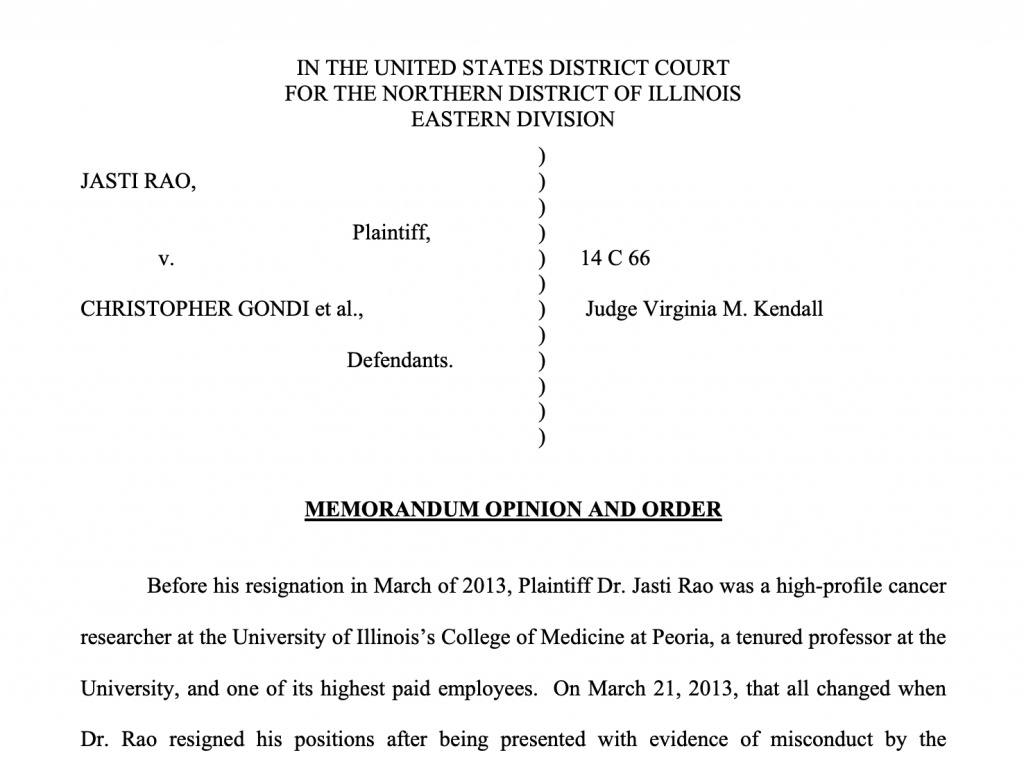
Jasti Rao, a former star scientist at the University of Illinois College of Medicine at Peoria whose career flamed out over concerns about misconduct, gambling and allegations that he had mistreated employees, is now up to 16 retractions.
The International Journal of Oncology, a Spandidos title, has retracted three of Rao’s papers dating back to 2011, citing the presence of “falsifying elements” in the images.
Here’s the notice for the 2011 paper “Oncogenic role of p53 is suppressed by si‑RNA bicistronic construct of uPA, uPAR and cathepsin‑B in meningiomas both in vitro and in vivo”:
Following the publication of the above paper, we were contacted by the University of Illinois at Chicago, to request the retraction of the above article. Following a formal institutional investigation, the investigation panel concluded that the images in question had falsifying elements. Regarding the above study, the specific allegations that were investigated were that of falsifying elements of Fig. 1B, bottom panel, columns 2 and 3; Fig. 4A, top panel, columns 4, 5 and 6, and middle panel, columns 1, 2 and 3; and Fig. 7D, row 1, column 1 and row 2, column 1.
Following a review of this paper conducted independently by the Editor of International Journal of Oncology, the Editor concurred with the conclusions of the investigation panel, and therefore the above paper has been retracted from the publication. We also tried to contact the authors, but did not receive a reply. The Editor apologizes to the readership for the inconvenience caused.
The journal also is retracting “α3β1 integrin promotes radiation-induced migration of meningioma cells” and “Metabolic remodeling precedes mitochondrial outer membrane permeabilization in human glioma xenograft cells,” both of which it published in 2012.
Nearly 90 of Rao’s papers have been flagged on PubPeer.
Rao, you may recall:
ran up tens of thousands of dollars in gambling debts, much of which he accrued on the university’s time, and even had his credit cut off by the Par-A-Dice Casino in Peoria.
He also sued the University of Illinois to regain his position — which at one time paid $700,000 a year — and “clear his name” but lost.
Despite the retractions, Rao was never found guilty of having committed the misconduct. Instead, according to court documents, the institutional report into his research:
concluded that it “could not reach the level of confidence as indicated by the term ‘preponderance’” to find that Plaintiff was directly responsible for the issues with the papers under review, finding instead, that he acted recklessly …
The journal did not respond to an email requesting comment on the retractions, and whether they resulted from a new inquiry into Rao’s articles or the one we reported on in 2018.
Like Retraction Watch? You can make a tax-deductible contribution to support our work, follow us on Twitter, like us on Facebook, add us to your RSS reader, or subscribe to our daily digest. If you find a retraction that’s not in our database, you can let us know here. For comments or feedback, email us at [email protected].
Unfortunately there is much worse unnoticed hidden data business in clinical medicine. There should be a popular movment against such malpractice.